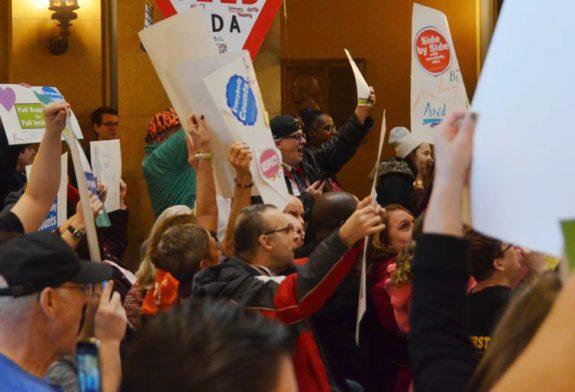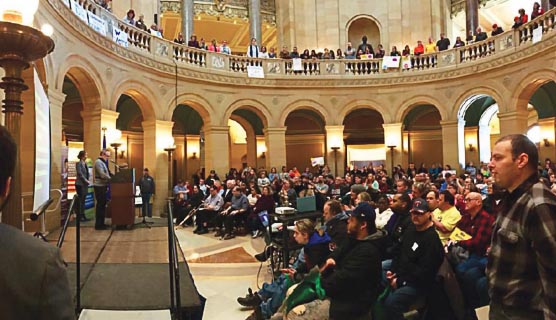2018: Disability Day highlights several key needs
Access Press
3/10/2018 by Jane McClure
With the 2018 Minnesota Legislature in full swing, disability groups are making the case for a wide range of policy and spending bills. The calls for more spending for needed supports and services is bolstered by the budget forecast released at the end of February. A surplus of $329 million is projected. A deficit had been predicted in December 2017, which was the state's first in five years.
Who benefits from the modest surplus remains to be seen. At a news conference Minnesota Management and Budget Commissioner Myron Frans cautioned that the figure is less than 1 percent of the state’s total two-year budget. Frans and Gov. Mark Dayton also said a positive balance shouldn’t be taken for granted and that spending needs to be looked at carefully. Dayton’s budget recommendations will be announced March 15.
A lot of factors could affect what is ultimately allocated this session, including the national economy, federal tax code changes and competing state financial needs. One issue that has to be tracked is if federal tax law changes provided a one-time or ongoing benefit.

Disability advocates contend their needs have been put off for years and can no longer wait. A large crowd from around the state descended on the state capitol February 27 for Disability Day at the Capitol. Waving signs, chanting and cheering, the crowd delivered the message that they want change.
“We need your voices here, and your voices need to be heard,” said Sen. Kent Eken (DFL-Twin Valley). He continues to focus on the need for a state constitutional amendment that would dedicate a funding stream to long-term care.
Amy Zellmer, who lives with traumatic brain injury, emphasized the importance of everyone sharing their stories with lawmakers. “When we share our stories, people listen” Zellmer said. “They connect with us. They learn from us. And more importantly, they take action with us.”
Speakers outlined a wide range of topics including the need for additional complex care funding, more attention to Consumer-Directed Community Supports (CDCS) and inclusion of fetal alcohol syndrome in brain injury waiver programs.
The complex care issue is a difficult one. A group had worked in 2017 for higher wages for people who need 10 or more hours of care per day. Supporters left the capitol at session's end thinking they had achieved their goal of higher wages for workers who provide complex care. "And then magically in the middle of the night, the bill disappeared," said Jeff Bangsberg. He and fellow self-advocate Lance Hegland said the bill, which is technically still active, need to pass this session.
“We’d love to see a rate increase for everyone who provides care, but we need the focus now on people who have the greatest needs,” Bangsberg said.
Hegland relies on more than 12 hours of care each day. “These supports are vital to my health and safety,” he said. “These supports are critical to help me participate in daily activities, to work plus to participate in activities with family, friends and community.” Hegland said without support he and others cannot survive. But the workforce shortage makes it difficult for him and others to hire care workers.
 Parent Scott Price spoke to the Disability Day at the Capitol rally about how state programs have helped his family
Parent Scott Price spoke to the Disability Day at the Capitol rally about how state programs have helped his family
